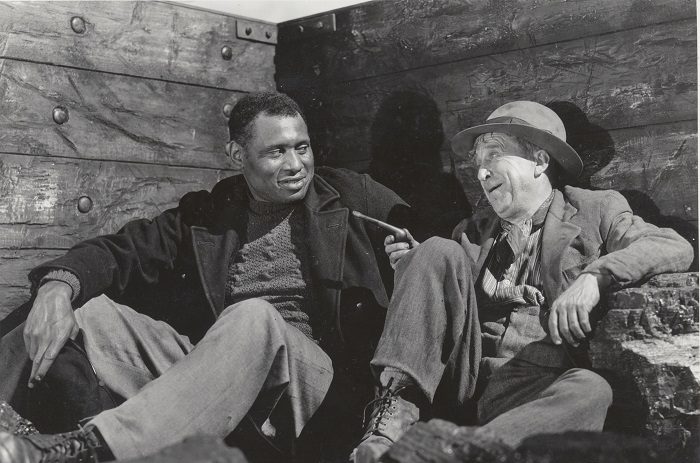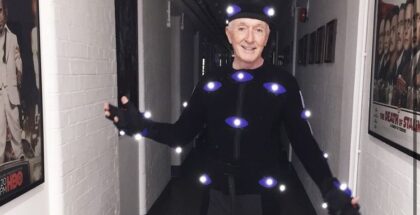BLACK STAR: BFI Player to release Paul Robeson collection online
David Farnor | On 10, Nov 2016
The BFI is celebrating the work of the towering Paul Robeson (1898-1976) as part of its BLACK STAR season this winter – and to bring his work and legacy to a new generation of fans, BFI Player will be releasing a dedicated collection of his work online.
The American-born actor, singer, athlete, lawyer and political activist was a true transatlantic trailblazer with a central role in the American Civil Rights Movement, who found fame in the UK and went on to make a significant impact in British film and theatre.
Robeson travelled to the UK in the late 1920s, searching for opportunities that were not available for black actors in America at the time. In the UK, he took to both stage and screen, becoming the first black actor to play Othello (1930) in over a century and originating the iconic role of ‘Joe’ in the West End theatre production of Show Boat and later in the film adaptation, which went on to become a box office hit.
Determined to break through the stereotypes associated with black actors, he was insistent on playing challenging and insightful roles and this can be seen through his work, particularly in The Proud Valley and Song of Freedom, the two films he cites as his most significant.
“In addition to Paul Robeson’s myriad talents as an entertainer, he showed extraordinary moral courage and political conviction at each step. In Britain, he enjoyed a phenomenally successful screen career, effectively becoming the UK’s first black screen star,” says Ashley Clark, BFI BLACK STAR Season Programmer. “. “In the case of Big Fella (dir. J. Elder Wills, 1937), Paul Robeson was given final cut approval, an unprecedented option at the time for an actor of any race.”
The BFI’s Paul Robeson retrospective will include screenings at BFI Southbank in London of 1940s classic, The Proud Valley (dir. Pen Tennyson), a gritty and heartfelt social drama, in which Robeson plays an American stoker who finds work in a Welsh mining community; Song of Freedom (dir. J. Elder Wills, 1936), about a London dock-worker who finds fame and fortune as an opera singer and then uses his wealth to seek out his African heritage; Body and Soul (dir. Oscar Micheaux, 1925), Robeson’s feature film debut, where he stars as an escaped convict trying to pass as a local preacher in the Deep South, and more.
Can’t make it to London? As part of the BFI’s Black Britain on Film project, newly digitised versions of Paul Robeson films will also be available on BFI Player from Friday 11th November to audiences across the UK, including The Proud Valley, Song of Freedom, Body and Soul, and The Black Emperor (1949), a short excerpt from Song of Freedom, which charts the rise of Paul Robeson’s character to stardom as an international opera singer.
The collection will also feature Sanders of the River (dir. Zoltan Korda, 1935) about a West African chief (Robeson), who helps a British Commissioner restore order to his kingdom. Robeson disowned this film as it uncritically retains the patronising racism of Edgar Wallace’s novel. However, Sanders of the River is presented as part of the Paul Robeson collection as an interesting turning point in Robeson’s film career, when he became insistent on playing roles that broke away from racial stereotypes.
Black Britain on Film is a major new collection of over 150 film and TV titles that uncovers the heritage of black Britain. It features some of the earliest appearances of black Britons in two films by Mitchell & Kenyon, as well as ground-breaking post-war documentaries with fascinating insights into black communities. The collection includes lesser-known TV drama, contemporary features and films of iconic figures, such as Muhammed Ali, Malcolm X and Martin Luther King.
Black Britain on Film complements the BLACK STAR season and is available to stream on BFI Player, mostly for free. It is part of the BFI’s five-year Britain on Film project to digitise, and make available online, 10,000 films from the BFI National Archive and the UK’s national and regional film archives by 2017.
Here’s the full line-up of Robeson films on BFI Player from Friday:
Body and Soul (dir. Oscar Micheaux, 1925)
In his screen debut, Robeson delivers an electrifying performance as an escaped convict trying to pass as a local preacher in the Deep South. Body and Soul, which firmly established the ‘Micheaux style,’ is a seminal film in the history and advancement of black cinema.
Sanders of the River (dir. Zoltan Korda, 1935)
British Commissioner Sanders rules the West African territories in the manner of a strict father, watching over his subjects with a combination of force and indulgence. When Sanders takes a period of leave, his kingdom falls into disarray, until order is restored with the help of the loyal chief Bosambo (Robeson).
Borderline (dir. Kenneth Macpherson, 1930)
Robeson and his wife star in his tense, fragmented psychological thriller about an interracial love triangle. Pete and Adah are reunited when Adah discovers her lost love is working in a nearby hotel, but her new partner, a white man, erupts into a deadly rage. Formally and socially innovative, this groundbreaking film uses what lesbian poet HD (also starring) called ‘clatter montage’ to draw out the raw, emotional inner worlds of its diverse cast.
Song of Freedom (dir. J. Elder Wills, 1936)
A lowly London dock-worker suddenly finds fame and fortune as a world-famous opera singer, then uses his wealth to seek out his African heritage. Robeson, in the lead role, is a powerful onscreen presence in this unusual and entertaining early Hammer drama, which includes highlights such as ‘Sleepy River’ – delightfully performed as a duet with his co-star Elisabeth Welch.
Show Boat (dir. James Whale, 1936)
A stunning screen version of the ground-breaking Jerome Kern/Oscar Hammerstein II musical, itself based on the Edna Ferber novel, about life on and around a Mississippi steamboat. Robeson had played the role of Joe, the stevedore, over 500 times on the stage, and his rendition, in a tour-de-force four-minute sequence, of ‘Ol’ Man River’ is a definite highlight of the film.
Jericho (dir. Thornton Freeland, 1937)
Despite saving the lives of his comrades aboard a torpedoed military ship, courageous American WWI soldier ‘Jericho’ Jackson (Robeson) is unjustly sentenced to death after he’s involved in the accidental death of a sergeant. Escaping and fleeing to Africa, Jericho becomes the powerful leader of an Arab tribe. This compelling drama also sees Robeson, on fine form, sing some splendid songs.
King Solomon’s Mines (dir. Robert Stevenson, 1937)
Africa, the 1880s. Umbopa (Robeson), the dispossessed King of the Kukuana people, is determined to return home and reclaim his throne. He poses as a guide and accompanies a group of English explorers on a perilous journey to his homeland, and the gold mines of King Solomon.
When they reach Kukuanaland, Umbopa reveals to the explorers his true identity, and takes charge of the expedition. The explorers support Umbopa in his battle to defeat the evil, one-eyed King Twala. After the battle, Umbopa is restored to his throne, and in gratitude to the explorers he leads them to the gold mines of King Solomon. Umbopa has to rescue them when they are trapped in the mines by the ancient witch doctor, Gagool, believed to be hundreds of years old. Umbopa becomes the proud king of an independent African country.
The Proud Valley (dir. Pen Tennyson, 1940)
As an African-American stoker who finds work down the pit in a Welsh mining community, Robeson, in his last British feature, was provided with his best screen role, and the one of which he was most proud. The Proud Valley is a gritty and heartfelt social drama, but one with plenty of time for song – most memorably with Robeson’s moving performance of the spiritual ‘Deep River’.
The Mining Review 2nd Year No. 11 (dir. Peter Pickering, 1949)
The highlight of this 1949 issue is the visit of American actor and singer Paul Robeson to Woolmet Colliery near Edinburgh. Robeson was also a renowned (and often persecuted) left-wing political activist and he made several visits to British mining communities. On this occasion he sings ‘I Dreamed I Saw Joe Hall Last Night’ for miners in the canteen, a song about an American trade unionist who was allegedly framed on a murder charge and executed in 1915.
The Black Emperor (1949)
Paul Robeson was one of British cinema’s most bankable stars of the 1930s and his 1937 feature Song of Freedom was repurposed after the war for home viewing. This short extract charts the rise of his character John Zinga to stardom as an international opera singer. It features two songs from the film, Stepping Stone and the song from the onscreen opera, Black Emperor.




















